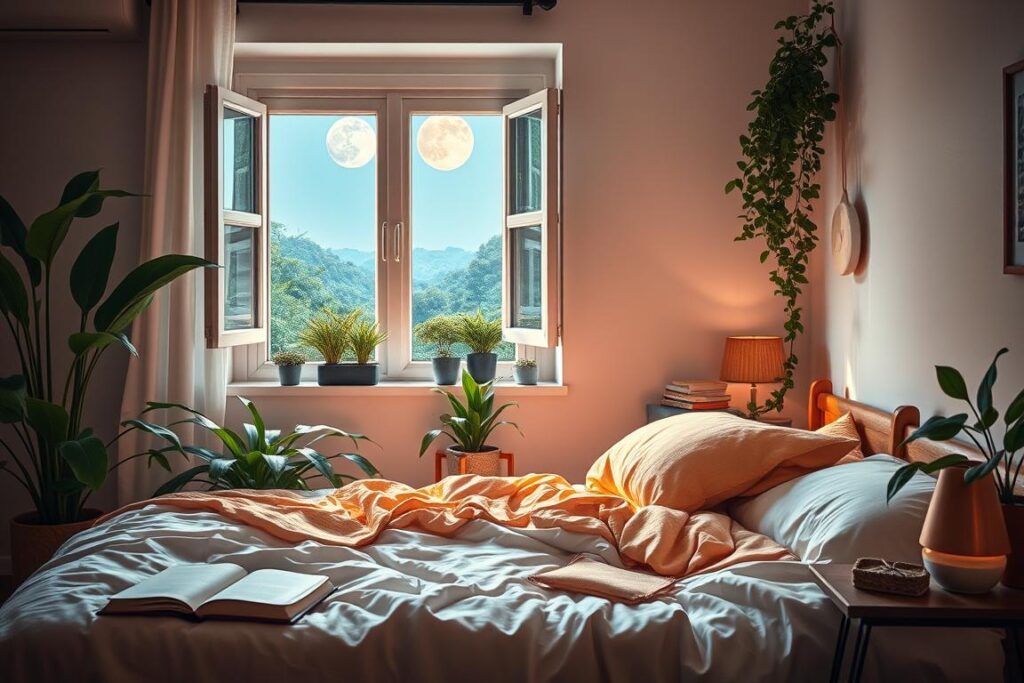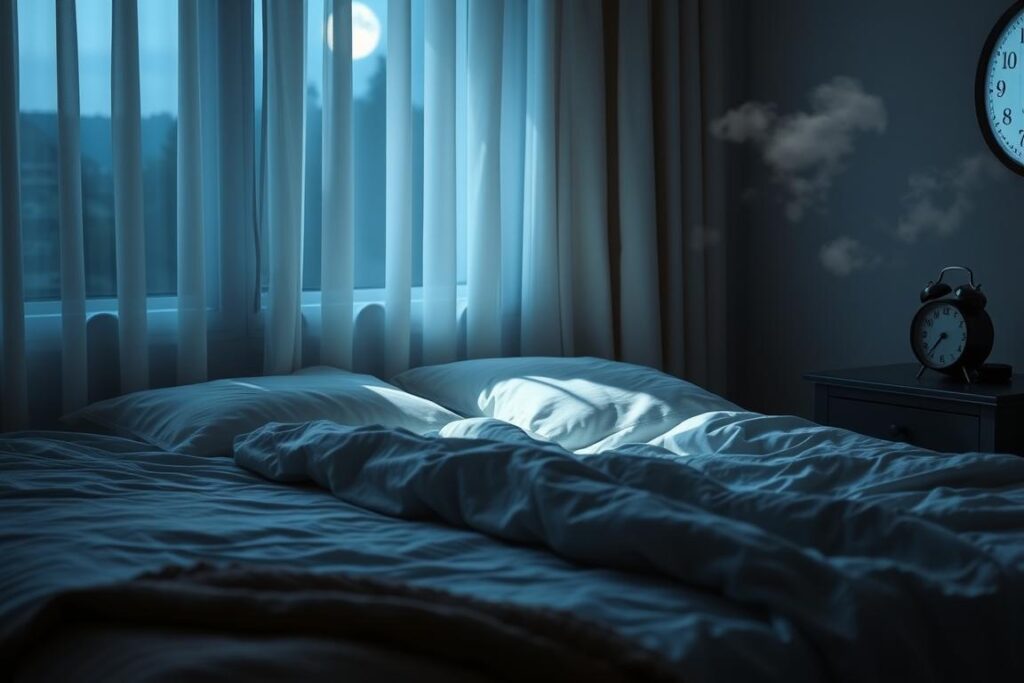Why do women need more sleep? They are 40% more likely to have insomnia than men. In addition, they are almost twice as likely to suffer from anxiety and depression. These conditions are often linked to lack of sleep.
Studies show that women sleep 15 to 30 minutes more per night. However, their sleep quality is lower. This includes more interruptions, such as insomnia and sleep apnea. Hormonal fluctuations also affect sleep, especially before menstruation.
It is crucial to understand women's sleep needs. They have different needs than men. In this section, we will explore why women need more sleep. We will see how this affects their health and well-being.
The Science Behind Female Sleep
THE female sleep is complex, involving biological and hormonal factors. Women have a circadian cycle shorter than men. This can change the quality and quantity of sleep.
You hormones are essential for the female sleep, especially in the menstrual cycle. Fluctuations in estrogen and progesterone levels influence the women's health and sleep.
Biological Differences Between Men and Women
Women are more likely to develop heart disease and depression without adequate sleep. They also take longer to fall asleep than men.

The Role of Hormones in Sleep
You hormones female hormones, such as estrogen and progesterone, influence sleep. Changes in the levels of these hormones affect the quality of sleep and women's health.
- Estrogen: regulates the menstrual cycle and affects the quality of sleep.
- Progesterone: helps regulate sleep and relaxation.
How the Female Brain Processes Sleep
The female brain processes sleep differently. Women have more insomnia and sleep disorders. This can harm women's health and quality of life.
Why Women Need More Sleep Than Men: Scientific Evidence
Studies show that women sleep 15 to 30 minutes more than men. This may be because women's brains are more complex, so they need more rest.
THE sleep quality is essential for the mental health and women's physical fitness. Sleeping too little can cause problems such as depression and anxiety.
Some scientific evidence supporting the need for more sleep in women includes:
- Women spend more time in deep sleep than men.
- THE sleep quality is lower in women than in men.
- Women are more likely to develop mood disorders anxiety and depression than men.
THE mental health of women is very much linked to sleep quality. Studies indicate that those who sleep well have fewer sleep problems. mental health. Therefore, it is crucial that women prioritize sleep and seek to improve it. sleep quality to take care of mental health and physics.

The Impact of the Menstrual Cycle on Sleep
THE menstrual cycle affects women's sleep. Hormonal changes during the cycle can cause insomnia and drowsiness. This happens because the levels of hormones how estrogen and progesterone change.
Some women have difficulty sleeping during the premenstrual phase. menopause can also cause night sweats and hot flashes. This makes it difficult to sleep due to the drop in estrogen.
Changes During Different Phases of the Cycle
Women experience changes in sleep at different stages of the menstrual cycle. In the premenstrual phase, they may feel more sleep and have trouble sleeping. During menopause, hot flashes and night sweats can affect the sleep.
How to Adapt Your Sleep Habits
To adapt your habits sleep to the menstrual cycle, it is important to have a routine sleep regular. Avoid caffeine and alcohol before bed. Create a calm sleeping environment.
Maintaining a healthy lifestyle helps regulate sleep. A balanced diet and regular exercise are essential.
Here are some tips to help women adapt their eating habits. sleep to the menstrual cycle:
- Establish a routine sleep regular
- Avoid caffeine and alcohol before bed
- Create a peaceful and comfortable sleeping environment
- Maintain a healthy lifestyle with a balanced diet and regular exercise
Consequences of Sleep Deprivation for Women
THE sleep deprivation greatly affects the women's health and the well-being. Studies show that women are 40% more likely to have insomnia than men. This can lead to depression, anxiety and heart disease.
Furthermore, the sleep deprivation can change women's lives. During menopause, many women experience sleep problems due to hormonal changes. This can last from 40 to 65 years. Up to 85% of women experience hot flashes during menopause, which can disrupt sleep.
To sleep better, it is essential to understand the effects of sleep deprivation. Keeping a regular sleep schedule helps a lot. It's also a good idea to avoid screen time before bed and create a good place to sleep.
- Women are 40% more likely to have insomnia than men.
- Women are almost twice as likely to be diagnosed with anxiety and depression.
- Life expectancy for women in Brazil is 79.0 years, with the majority living at least another 30 years after menopause.
The Role of Motherhood in Women’s Sleep
THE maternity is a crucial moment in women's lives. It can change the quality and quantity of sleep. About 461% of pregnant women face sleep problems.
Challenges include insomnia, daytime sleepiness, and waking up frequently. Furthermore, hormonal changes affect sleep.
After giving birth, mothers need strategies to help them sleep well. It is essential to find ways to improve sleep at each stage of the pregnancy. maternity.
| Statistics | Percentage |
|---|---|
| Pregnant women with sleep problems | 46% |
| Women with irregular cycles and sleep problems | 50% |
| Incidence of insomnia in postmenopausal women | 60% |
In short, the maternity is crucial for women's sleep. It's important to find ways to get good sleep at each stage. This includes taking care of your health and female sleep.
Practical Tips to Improve Sleep Quality
Improving sleep is crucial for health and well-being. One night routine, one sleep environment Proper and healthy eating habits are essential. This helps ensure quality sleep.
Have a night routine helps regulate the biological clock. This prepares the body for sleep. It is important to always go to bed and wake up at the same time, even on weekends.
Ideal Night Routine
To get started, create a sleep environment peaceful. This can be done by reducing the light, controlling the temperature and using a comfortable mattress.
Suitable Sleeping Environment
Avoid eating habits harmful to sleep is crucial. This includes avoiding caffeine and alcohol before bed. A balanced diet helps improve sleep.
Eating Habits and Sleep
For better sleep, follow tips to improve sleep. Avoid using electronic devices before bed. Create a relaxation routine before going to bed.
- Avoid caffeine and alcohol before bed
- Create a sleep environment quiet and comfortable
- Establish a night routine regular
- Avoid using electronic devices before bed
Quality sleep is essential for health and well-being. By following these tips and creating a sleep environment proper, you will improve your sleep. This way, you will wake up more rested and ready for the day.
The Relationship Between Sleep and Women’s Mental Health
The relationship between sleep and mental health feminine is complex. Lack of sleep can cause depression and anxiety. Women need more sleep than men to stay mentally healthy.
Some important facts about sleep and mental health feminine include:
- Approximately 8 in 10 pregnant women report sleep problems.
- Less than two-thirds of women get seven to nine hours of sleep a night.
- Hormonal fluctuations during the luteal phase can cause insomnia and fragmented sleep.
To get better sleep, it is essential to understand the relationship between sleep and mental health. The anxiety and the depression can affect your sleep. And the opposite is also true. If you are having trouble sleeping or mental health, seek help.
Remember that the mental health is as important as physical health. Seeking help for anxiety and the depression is crucial. It helps maintain mental health and sleep healthy.
Exercises and Activities That Promote Better Sleep
Exercises to improve sleep are essential for a healthy routine. Relaxing practices before bed, such as meditation or reading, can help reduce stress. This promotes more restful sleep. In addition, anti-stress meals can also improve the quality of sleep.
Benefits of Exercise
Physical activities Regular exercise, such as walking or running, can improve the duration and quality of your sleep. A 2015 meta-analysis showed that exercise improves sleep. Aerobic exercise helps you fall asleep faster and wake up less during the night.
Relaxing Practices
Relaxing practices, such as yoga or stretching, can reduce stress. This promotes more restful sleep. Physical activities Moderate activities, such as swimming or cycling, are also beneficial for sleep. It is crucial to find a balance between exercise and relaxing practices.
In short, exercises, relaxing practices and physical activities are essential for quality sleep. It is important to find a balance between these activities. This promotes better sleep and a healthier life.
| Activity | Benefit |
|---|---|
| Aerobic exercises | Improves sleep duration and quality |
| Relaxing practices | Reduce stress and promote more restful sleep |
| Moderate physical activities | They are beneficial for sleep health |
Conclusion
THE female sleep is essential for the women's health and well-being. It is important to understand women's sleep needs. They are different from men's.
We explore biological differences and the role of hormones. We also talk about the impact of the menstrual cycle and motherhood. And, of course, practical tips for improving sleep.
Studies show that women need more sleep. This is due to physiological and hormonal factors. women's mental health is also linked to sleep. Insomnia and sleep apnea are the most common among them.
Therefore, it is crucial to prioritize the healthy sleep. This helps prevent health problems. And improves overall well-being.
Adopting healthy habits and creating an environment conducive to sleep is essential. Women should be aware of changes throughout their lives. This way, they can ensure restful sleep and live a more balanced and productive life.


